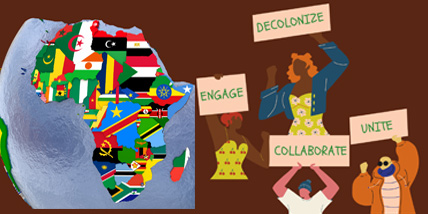Transforming African health systems to embrace diversity
- Wits University
Westernised health systems are dominant in Africa, a situation that calls for transformation to embrace more diverse forms of healing.
Health systems in Africa need a decolonial approach. A three-day convention hosted by the Wits School of Public Health will focus on decolonising African health systems. Titled, Decolonial thought and African consciousness for socially just health systems: An imaginative space, the virtual convention seeks to build collective capacity to engage in critical decolonial scholarship towards socially just health systems. The convention further aims to provide a platform for conversations to build solidarity across Africa and eradicate colonial-imposed divides in health systems on the continent.

Date: 30 September, 1-2 October 2020
Time: 14:00-17:30 SAST (South Africa time)
Zoom Registration: Click here
Laetitia Rispel, Professor of Public Health at Wits University, will facilitate a session on 30 September (14:40-15:20) titled, Exploring the intersection between decoloniality and African health systems - A conversation in ‘post-colonial’ Africa. The discussion will unravel the status quo in episteme traditions, and highlight knowledge systems and its relationship to the social world.
This session will focus on the intersection between decoloniality and African health systems. It will explore how decolonial theories or approaches could complement or advance the field of health policy and systems research. In this session, scholars will highlight and share diverse examples to begin to shift African health policy and systems research (HPSR) towards decolonised, egalitarian frameworks of research methodologies.
“The session on decoloniality is important in order to advance scholarship on the theme, contribute to improvements in the performance of health systems in Africa, and ultimately achieve good health for all the people in sub-Saharan Africa,” says Rispel.
On 1 October, Dr Kui Muraya, a postdoctoral social scientist at the KEMRI-Wellcome Trust Research Programme, will facilitate a panel on Creating an African project: Rethinking the configuration of knowledge to advance African health and health systems. The session will explore ways in which the field of HPSR offers theorisations and empirical work to guide scholars when engaging with the social, economic and political nature of health systems.
Tanya Charles, feminist activist, programme and impact lead at the Atlantic Institute, will facilitate session 3 (2 October, 14:40-15:20), From paradigm to praxis: Tools for decolonial, African health systems and policy and research. In this session, Charles will examine existing and possible ways to address and shift colonial structures of knowledge production within the academy, research institutions, and other sites of knowledge production.
Prioritising African Health Policy and Systems Research
With the focus on African health policy and systems research, the convention will reorient African knowledge, realities and people as legitimate knowledge-bearers who are able to shape the field on the continent and elsewhere.
The convention will bring together scholars, practitioners, artists, performers, creatives, media, policy-makers and activists whose work interests and work is on health systems in Africa and social justice issues.
For African HPSR and decolonial scholars in particular, this convention will explore the possibilities of a knowledge paradigm that frames decolonial research in HPSR and draws explicitly on decolonial theories and approaches, including anti-racist, critical race, Black Consciousness, queer and African feminist perspectives.
Shehnaz Munshi, convenor and Research Project Manager of the Sheiham Family Wits Programme on Social Determinants of Health and Health Inequality, says it is imperative to begin conversations that transform health.
“Today, health systems across Africa are failing to respond to the health and social needs of people. South Africa has inequitable private and public health systems, which are highly westernised. We need to probe them and change the narrative of health, and begin to recognise traditional and indigenous health systems that represent the diversity of the continent,” says Munshi.
The convention is one of five Africa-centred forums in the field of HPSR but the first focusing on decolonisation of HPSR on the continent. It takes an ambitious approach that the work of reimagining African consciousness is not only an intellectual task, but a visceral embodied journey.
It will establish strategies for dismantling processes and structures that produce and sustain inequities and injustices in health policies and systems.
“Through a process of politicizing and historicizing the HPSR space, we critically reflect on whether we are doing work that transforms unjust political, economic and social systems and structural arrangements.
The convention will grapple with the questions of “how do we as African HPSR scholars read health systems and policy recognise the erasure of our collective histories. How do we acknowledge the processes of othering and alienation? Can we see ourselves as colonised subjects that need to undergo healing and consciousness?,” says Munshi.
This event is co-sponsored by the Wits School of Public Health at the University of the Witwatersrand, Johannesburg; Health Systems Global; the Atlantic Institute; Tekano; and CHESAI.
